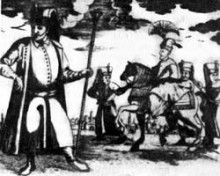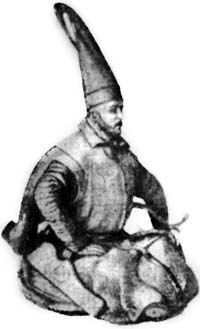History has a healing function. But its medicine is extremely bitter. Informed knowledge of the unvarnished truth about the past causes a thinking patriot of Ukraine (someone who is unable or unwilling to think is perhaps not a patriot by definition; a stupid patriot is either an unnatural absurdity, such as fried ice, or a tremendous misfortune for his own people) to feel profound pain and sadness. Yet deprived of the truth about our own history — or pride in our homeland, which can flourish only on the rich soil of accurate historical knowledge and facts, and not just emotions, even if they are noble- minded and sincere — we will inevitably turn into mankroots (a term coined by the famous writer Chengiz Aytmatov), who won’t stop at killing their own mothers. Obviously, it all comes down to having a personal system of values.
The following story is, unfortunately, not one of those that tickle our national pride. But it is all too true, much like the feats of our heroic forebears, the Zaporozhian Cossacks, who heroically opposed Turkish and Tatar expansion on the Ukrainian lands during the 16th-18th centuries. In this article I will discuss the Janissaries as a historical phenomenon (primarily spiritual), its causes, roots, and the impact of our own janissaries on the future course of Ukrainian history.
The great Ukrainian scholar, philologist, historian, Orientalist, and academician Ahatanhel Krymsky characterized the Janissaries as the “sultan’s caste-like infantry bodyguards.” He wrote: “If it wasn’t the first Ottoman ruler, Sultan Osman, who was forced to form such an army, then it certainly was Sultan Orkhan (1326-1359). Janissaries were recruited from among Christian boys, who were either kidnapped by the enemy or handed over voluntarily by their parents. Such boys underwent specialized Turkish military training. The Turks called such recruitment ‘devshirme’ or ‘blood tax.’ Initially there were 12,000 Janissaries, and subsequently many more. These children were raised as Muslims and were Turkified. At a Janissary congress that took place every 7 years, they were sent to different cities (Tsarhorod, Andriyanopil, Brus, etc.) to replace deceased members of this corporation. Janissaries were forbidden to marry. Those who became incapacitated during their service were expelled from the corporation.” In answer to the question of who was the primary target of the Janissaries’ military power, Krymsky noted: “This army displayed its strength not only in fighting the Slavs and Greeks, who had captured their native land, but also in the struggle against European knights.”
This unique phenomenon needs to be thoroughly studied: participation in campaigns against the Christian nations of Europe, especially the Slavic lands that were the homelands of most of the Janissaries, was seen as a matter of honor and proof of exceptional personal devotion to the sultan. Some of the Janissaries gradually withdrew from the incessant wars and became pageboys at the sultan’s court or at the courts of ranking Turkish officials, and even mastered professions and crafts, becoming builders, doctors, translators, etc. But, as Pavlo Zahrebelny rightly noted in his famous novel Roksolana (along with Roman Ivanychuk’s Malvy, this magnificent novel is a profound exploration of the roots of Janissary philosophy and the historical tragedy of the Ukrainian people, linked to this phenomenon): “Everywhere they (the Janissaries — Author) repaid the world with the same cruelty to which it had subjected them in their childhood.”
We are faced with a painful and even troubling question: Were there Ukrainians among these warriors of Allah? The 16th-century historian, a subject of the Rzeczpospolita and presumably a Ukrainian by birth, Mykhailo (Michalon) Lytvyn, who spent over a month in Istanbul, wrote: “All the ministers of those tyrants (sultans of the Ottoman Empire — Author), eunuchs, secretaries, wise men, and their personal bodyguards are Janissaries, who master military skills and discipline from childhood; the military commanders and barons who are elected from amongst them — all of them are of our blood.” This brings us to a somewhat different problem: the impact of Slavs (in particular, Ukrainians) on numerous aspects of the state, cultural, and spiritual policies of the Turkish empire was much greater and more extensive than we have been led to believe. Thus, a famous 16th-century politician and historian, the Italian traveling bishop Paolo Giovio (who wrote a treatise on life in Muscovy, published in 1526, and a 1531 study of Turkish history) pointed out: “At the sultan’s court (Suleiman the Magnificent, the most outstanding Turkish ruler — Author) different languages are used: Turkish — the language of the ruler; Arabic — the language of the Turkish law, the Koran; the third place is occupied by the Slavonic language, spoken by the Janissaries; the fourth place is occupied by the Greek language, spoken by the townsmen of Tsarhorod and other cities throughout Greece.” Meanwhile, in 1574 the Pole Maciej Stryjkowski saw indigent singers very similar to our kobzars delighting the common folk in the streets and eateries of Istanbul by singing songs in Slavic languages (presumably Serbian, Bulgarian, and Ukrainian) about the victories of the Turkish army and the sultan’s famous campaigns. Suleiman the Magnificent (1520-1566) spoke several Slavic languages. In the 17th century the famous Orientalist and traveler, Adam Olearius from Olsztyn, who traveled via Muscovy to Persia in 1636-1639, recalled: “As much as the Persian court in Isfahan likes the Turkish language, the favorite language of the sultan’s court in Tsarhorod [Constantinople] is Slavic.” Ahatanhel Krymsky mentioned the interesting fact that there were many Muslims among the Zaporozhian Cossacks of the 16th century (the contemporary Polish geographer and chronicler, Stanislaw Sarnicki, even claimed that they formed the majority among the Cossacks). Krymsky notes: “Let us assume that there is a great deal of exaggeration in Sarnicki’s words, but at the same time it is characteristic.”
The janissary phenomenon (in the broad sense of this word, and perhaps more relevant today) is not just a form of extreme, fierce cruelty. This phenomenon can also be manifested in subtle, educated, and noble forms, such as serving a foreign nation, state, or interests. The danger is that a spiritual janissary can always convince you that foreign things are in fact your own (where Turkey is concerned, there are more than enough facts to corroborate this). While the renunciation of one’s own country, land, and faith was not viewed as treason, the Janissaries were not required to renounce their mother tongue. The replacement of the spiritual “blood group” occurred rapidly, and the person became convinced that the foreign land (Turkey wasn’t the sole example) offered better opportunities for career growth and professionalism, etc. There is also an economic aspect to this phenomenon: we have often witnessed famous and fabulously wealthy businessmen working to develop the economy of a foreign country. The Janissaries of the 16th century were kidnapped by foreign aggressors. Meanwhile, who or what is behind the janissary phenomenon of our time? The lack of freedom in the country or the absence (not formal, the format attributes of our state are all neatly in place) of the country itself?








